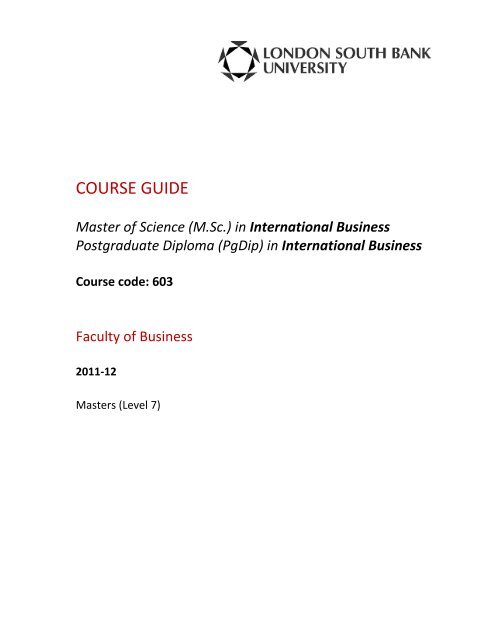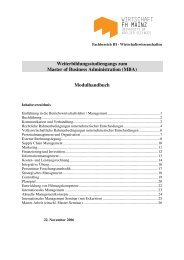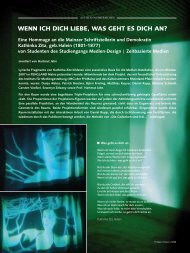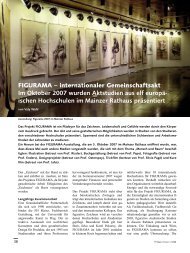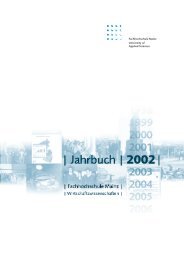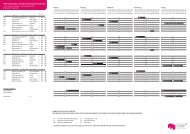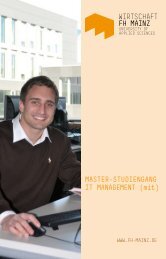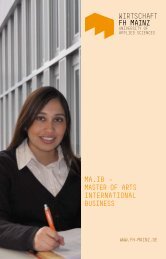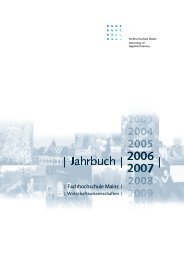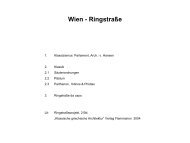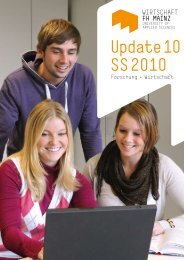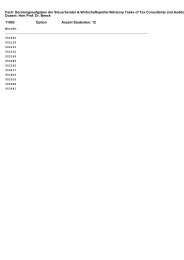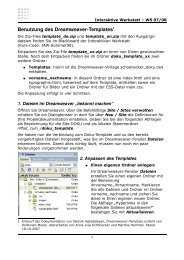COURSE GUIDE
COURSE GUIDE
COURSE GUIDE
Create successful ePaper yourself
Turn your PDF publications into a flip-book with our unique Google optimized e-Paper software.
<strong>COURSE</strong> <strong>GUIDE</strong><br />
Master of Science (M.Sc.) in International Business<br />
Postgraduate Diploma (PgDip) in International Business<br />
Course code: 603<br />
Faculty of Business<br />
2011‐12<br />
Masters (Level 7)
Table of contents<br />
Welcome to the M.Sc. in International Business ...................................................................................3<br />
Introduction .........................................................................................................................................3<br />
1. <strong>COURSE</strong> DETAILS AND MANAGEMENT ............................................................................................4<br />
1.1 Information and Communication .................................................................................................. 5<br />
1.2 Course Calendar ......................................................................................................................... 5<br />
2. <strong>COURSE</strong> DESCRIPTION .....................................................................................................................7<br />
2.1 Title of Course ............................................................................................................................ 7<br />
2.2 Mode and Pattern of Attendance ................................................................................................. 7<br />
2.3 Attendance in Other Countries ..................................................................................................... 7<br />
2.4 Course Philosophy ...................................................................................................................... 7<br />
3. <strong>COURSE</strong> AIMS AND OBJECTIVES .................................................................................................... 10<br />
3.1 Aims ........................................................................................................................................ 10<br />
3.2 Objectives ................................................................................................................................ 10<br />
3.3 Expected Career Paths ............................................................................................................... 10<br />
3.4 English Language Policy ............................................................................................................. 11<br />
3.5 Equal Opportunities .................................................................................................................. 11<br />
3.6 Disability Policy ......................................................................................................................... 11<br />
3.7 Dyslexia Support ....................................................................................................................... 11<br />
4. <strong>COURSE</strong> STRUCTURE ..................................................................................................................... 12<br />
4.1 Course Structure ....................................................................................................................... 12<br />
4.2 Option Units ............................................................................................................................. 14<br />
5. TEACHING AND LEARNING PATTERNS ........................................................................................... 15<br />
5.1 The Taught Units ...................................................................................................................... 15<br />
5.2 Assessment Rationale ............................................................................................................... 16<br />
5.3. Personal Development Planning (PDP) ........................................................................................ 22<br />
6. LEARNING SUPPORT ..................................................................................................................... 24<br />
6.1 Subject Support for Individual Modules ....................................................................................... 24<br />
6.2 General Learning Support .......................................................................................................... 24<br />
7. CONTRIBUTING TO THE DEVELOPMENT OF THE <strong>COURSE</strong> ............................................................... 26<br />
7.1 Course Management ................................................................................................................. 26<br />
7.2 Course Board ............................................................................................................................ 26<br />
7.3 Course Monitoring Procedures ................................................................................................... 26<br />
8. <strong>COURSE</strong> REGULATIONS ................................................................................................................. 27<br />
8.1 Assessment Regulations: Awards and Progression ........................................................................ 27<br />
8.2. Award Board and External Examiners .......................................................................................... 30<br />
MSc International Business Course Guide 2
Welcome to the M.Sc. in International Business<br />
Welcome to the Masters Degree programme in International Business of London South Bank University,<br />
in conjunction with University of Applied Sciences, Mainz, Germany; Loyola College, University of<br />
Madras; Assumption University (ABAC), Bangkok, Thailand; In Pole University, Leonardo da Vinci, Paris,<br />
France; INHolland University of Applied Sciences, Amsterdam, The Netherlands; and the International<br />
Business Academy, Kolding, Denmark (Distance Learning).<br />
This programme is offered by LSBU’s Faculty of Business. The Faculty is highly ranked with a long<br />
established reputation for teaching and research in Business Studies.<br />
This guide is designed to provide you with the information you need to study on the programme and<br />
details of who to contact if you have any further questions.<br />
I hope you will find the M.Sc. International Business enjoyable, fulfilling and challenging. My colleagues<br />
and I are here to try to ensure that this is the case.<br />
Colquhoun Fergusson<br />
Course Director<br />
Introduction<br />
The purpose of this guide is to provide you with the information you need about the course. It contains<br />
sections on course management/administration, aims and learning outcomes, course structure, you<br />
should retain this guide for future reference.<br />
MSc International Business Course Guide 3
1. <strong>COURSE</strong> DETAILS AND MANAGEMENT<br />
Course Details:<br />
Name of Award: Master of Science (M.Sc.) in International Business<br />
Postgraduate Diploma (PgDip) in International Business<br />
Level: 7 (Masters)<br />
Award with distinction possible: Yes<br />
Validating Body: London South Bank University<br />
Business & Management: Type 1 A/B Specialist Master’s Degree<br />
Quality Assurance Agency for Higher Education N o Length and mode:<br />
CL12/02<br />
Full‐time: 2 semesters + dissertation stage (semester 3)<br />
Part‐time: 4 semesters + dissertation stage (semester 5)<br />
Calendar: Semesters<br />
Faculty:<br />
Course Management Team:<br />
Business<br />
Course Director London: Colquhoun Ferguson<br />
Room: L321 (London Road)<br />
email: fergusc2@lsbu.ac.uk<br />
Phone: 020 7815 7871<br />
Associate Course Director London: Ceyhun Elci<br />
Room: L317 (London Road)<br />
email: ceyhun.elci@lsbu.ac.uk<br />
Course Manager (Administrator)<br />
Lodnon:<br />
Phone: 020 7815 7071<br />
Fatmatta Sawlani<br />
Room: L105 (London Road)<br />
email: sawlanf@lsbu.ac.uk<br />
Phone: 020 7815 7409<br />
Course Director Germany: Professor Rudiger Nagel<br />
email: Prof.Nagel@t‐online.de<br />
Course Manager Germany: C. Dolle‐Gschweng<br />
email: claudia.dolle‐gschweng@wiwi.fh‐mainz.de<br />
website: http://www.fh‐mainz.de/business/study‐<br />
programmes/international‐business‐msc‐master‐full‐time‐<br />
postgraduate/index.html<br />
Course Director India: Dr. A. Marcus<br />
email: kittipht@au.edu<br />
Course Manager India: M. Vijayan<br />
email: ciployola@gmail.com<br />
website: http://www.loyolacollege.edu/M.Sc.IB_Southbank.htm<br />
Course Director Thailand: Kitti Photikitti<br />
email: kittipht@au.edu<br />
Course Manager Thailand: Cho Cho Kun<br />
email: chocho.abac@yahoo.com<br />
website: http://www.grad.au.edu/program/<br />
Course Director France: Maryse Chanteloup<br />
e‐mail: maryse.chanteloup@devinci.fr<br />
website: http://www.emlv.fr/formations/programmes/masters/msc‐<br />
international‐business/msc‐international‐business.342.html<br />
Course Director Holland: Tiny Gilliam<br />
email: tiny.gilliam@inholland.nl<br />
website: http://www.inholland.nl/<br />
MSc International Business Course Guide 4
1.1 Information and Communication<br />
Course Guide and Module Guides<br />
This guide provides you with general information on the course, details of individual modules<br />
are contained in the relevant Module Guide’s.<br />
Blackboard<br />
The blackboard site http://blackboard.lsbu.ac.uk/, once logged‐in, contains the latest version of<br />
this Course Guide, Module Guide’s, learning materials, assessments, notices relating to the<br />
course, etc. You should view this site regularly to keep in touch with developments on the<br />
course and modules<br />
Contacting staff<br />
For advice and guidance on all matters relating to the programme, you can contact Colquhoun<br />
Ferguson and the course administrator (see page 4), who will refer you to University services as<br />
appropriate. For academic matters relating to individual modules the first point of contact<br />
should be module leaders whose details are listed in Section 4 below. A full list of staff tutors<br />
for each module and their office hours are contained in the relevant module guide.<br />
Day‐to‐day communications<br />
You must provide the course administrator with an up‐to‐date email address and<br />
telephone contact number.<br />
This email address will be used when we need to contact you, for example to give you your<br />
results.<br />
You should regularly check your LSBU email address, as this will be used by the blackboard<br />
system.<br />
You should view the notices on the M.Sc. International Business (IB) blackboard site<br />
regularly.<br />
If you are unable to attend classes you should inform the course administrator. Long term<br />
absence should be discussed with the Course Director: Colquhoun Ferguson.<br />
If a tutor fails to turn up for a class please inform the course administrator.<br />
If you are in doubt or unsure about something please contact either the course<br />
administrator or Colquhoun. We are here to support you.<br />
1.2 Course Calendar<br />
The University operates a semester system; the academic year is divided into two semesters,<br />
each of which lasts fifteen (15) weeks. The calendar is interrupted by holiday periods at<br />
Christmas, Easter and Whitsun. The university calendar dates for 2011‐12 are on page 6.<br />
The first thirteen (13) weeks of each semester consist of lectures and seminars, which are then<br />
followed by examinations. During each semester, you take three (3) modules. The dissertation<br />
stage is commenced at the end of the second semester. You are required to submit your<br />
dissertations by 10 December, 2012.<br />
The course begins with enrolment and orientation, during which you are introduced to the<br />
procedures and regulations of the university and receive further information about the<br />
structure and operation of the course.<br />
MSc International Business Course Guide 5
LSBU 2011‐12 Calendar Note: Semester 1 timings will vary by centre<br />
SEMESTER 1<br />
2011 Week<br />
September 12 Pre Study Economics Begins till September 30<br />
September 19 LSBU Enrolment<br />
September 20 LSBU Orientation<br />
September 26 1 Semester 1 ‐ Full teaching begins: Lectures & Seminars<br />
October 3 2<br />
October 10 3<br />
October 17 4<br />
October 24 5<br />
October 31 6<br />
November 7 7<br />
November 14 8 Course Board Meeting (provisional)<br />
November 21 9<br />
November 28 10<br />
December 5 11 Semester 2: Option form completed and returned<br />
December 12 12 LSBU Autumn Term ends December 16<br />
2012 Christmas Break (3 weeks)<br />
January 9 13 LSBU Spring Term begins January 9<br />
January 16 14 Semester 1 exams Week 1<br />
January 23 15 Semester 1 exams Week 2<br />
SEMESTER 2<br />
January 30 1 Semester 2 ‐ Full teaching begins: Lectures & Seminars<br />
February 6 2<br />
February 13 3 February 17‐19, Residential weekend (provisional)<br />
February 20 4<br />
February 27 5<br />
March 5 6 Provisional exam results released<br />
March 12 7<br />
March 19 8 Course Board Meeting (provisional)<br />
March 26 9 Spring term ends, April 8<br />
Easter break (3 weeks)<br />
April 23 10 Summer term begins, April 23<br />
April 30 11<br />
May 7 12<br />
May 14 13<br />
May 21 14 Semester 2 exams Week 1<br />
May 28 15 Semester 2 exams Week 2<br />
June 4 Recess week<br />
June 8 June 8 End of Semester 2<br />
SEMESTER 3<br />
June 11 1+ Semester 3 ‐ Dissertation stage begins<br />
Early July LSBU examination board<br />
Mid July Examination results<br />
August 13 Resit coursework deadline (provisional)<br />
August 20 Resit examinations (provisional)<br />
December 10 27 Dissertation deadline<br />
2013<br />
March 4 LSBU Awards board ‐ Masters Result (provisional)<br />
July 22 Degree ceremonies 22‐26 July<br />
MSc International Business Course Guide 6
2. <strong>COURSE</strong> DESCRIPTION<br />
2.1 Title of Course<br />
Masters of Science (M.Sc.)/Postgraduate Diploma (PgDip) in International Business<br />
2.2 Mode and Pattern of Attendance<br />
Currently, the course is taught on a full‐time and part‐time basis, with entry possible only at<br />
the beginning of the academic year in September. The course has two parts:‐<br />
a) A taught part that for full‐time students is spread over two semesters, each of which<br />
lasts for fifteen weeks. In each semester, you take three modules, each of which<br />
involves attendance for a minimum of four hours per week (five hours for some units).<br />
Part‐time students take two modules per semester for four semesters.<br />
b) The Dissertation Stage, during which students undertake your own research.<br />
As a requirement you must attend the Residential Weekend, which takes place in February<br />
during the second semester. (Further details are given below).<br />
2.3 Attendance in Other Countries<br />
The first semester of the programme is also taught in English in 4 other centres:‐<br />
University of Applied Sciences, Mainz, Germany<br />
Loyola College, University of Madras, Chennai, India<br />
Assumption University (ABAC), Bangkok, Thailand<br />
INHolland, University of Applied Sciences, Amsterdam, The Netherlands<br />
Students taking the first semester in one of these centres follow the same study and<br />
assessment programme as London. After completing the first semester assessments, students<br />
from these centres join the second semester at London South Bank at the end of January. All<br />
students are encouraged to stay in London for the Dissertation Stage, although there is no<br />
requirement to attend any classes during this time during semester 3.<br />
Students from Paris follow a different pattern taking the first semester at LSBU and the second<br />
semester in Paris.<br />
2.4 Course Philosophy<br />
Introduction<br />
The subject of International Business has been a central focus for staff drawn from a variety of<br />
subject areas in the Faculty of Business for more than twenty years. Initially, a number of<br />
undergraduate programmes in International Business were developed. These included a<br />
Bachelors degree in International Business with Languages and an International Business<br />
pathway on the Bachelor in Business Studies/Administration. Subsequently, this led to the<br />
development of the current Masters’ programme after continuous developments taking into<br />
consideration the fast‐moving international business environment. Underpinning curriculum<br />
development has been a strong research interest on the part of staff within the Faculty. This is<br />
now formalised in the Centre for International Business (See page 16 below)<br />
http://www.lsbu.ac.uk/cibs/ which runs a lecture and seminar series and publishes a working<br />
paper series. Students will find the events mounted by the centre extremely useful to<br />
supplement their studies, to provide ideas and methodologies for dissertations.<br />
MSc International Business Course Guide 7
The Masters in International Business began as a small, part‐time, evening‐only programme,<br />
before being offered as a full‐time course also. Thereafter, the course grew to the present size<br />
of roughly 150 students a year. At the same time, collaborative programmes were begun with<br />
several universities in other countries, beginning with Assumption University in Bangkok in<br />
Thailand. Later, they were expanded to include the University of Applied Science in Germany,<br />
Loyola College in India and Beijing Institute of Technology in China. Recently, a part‐time, e‐<br />
learning version of the course has been developed jointly with the International Business<br />
Academy in Denmark. Furthermore the course has begun collaborations with Pôle University,<br />
Léonard de Vinci in France and INHolland, University of Applied Science in The Netherlands.<br />
The Focus of the Course<br />
The major reason for running a Masters in International Business has been the increased<br />
importance of the international dimension in the business world. In the modern world, most<br />
large and medium‐sized companies, and even many small companies, are, to some degree,<br />
operating in a global environment. The market for their goods or services is likely to be, at least<br />
partially, an international one. This requires them to seek out customers or clients outside the<br />
boundaries of their own country. The development of overseas production of goods or services<br />
has meant that increasingly companies are becoming multi/transnational corporations. A recent<br />
controversial development has been the practise of companies outsourcing essential services or<br />
production processes to other countries.<br />
The increased importance of the international dimension to business is a reflection of the<br />
process of globalisation. Through the expansion of trade and investment, countries have<br />
become more integrated and, hence, more interdependent than ever before. As capital has<br />
been able to flow more freely from one country to another, financial markets have become<br />
increasingly interconnected. Increased movements of people and the growth of new forms of<br />
international communication have served, further, to raise the awareness of companies to<br />
business opportunities abroad. Mass advertising and new methods of selling goods and services<br />
have caused markets to become more global in scope.<br />
All aspects of the business function – organisational structures, employment policy,<br />
management systems, accounting arrangements, marketing strategies and financial decision‐<br />
making – have been affected by the globalisation of the business environment. This means that<br />
no managers can operate successfully in the modern world without an appreciation and<br />
understanding of these developments.<br />
The Internationalisation Process<br />
The MSc International Business seeks to cover all the key aspects of this internationalisation<br />
process, through a study of the core areas that constitute the subject of international business:‐<br />
International Business Economics: ‐ this module both trade and finance as it examines the<br />
massive expansion of world trade in both goods and services that has occurred since 1945.<br />
It examines the major changes in the way that countries trade with each other, new sources<br />
of international competition and new rules and institutions governing world trade. While<br />
considering the expansion of global finance that has opened up new financial markets and<br />
led to the development of new financial instruments and the growth of international<br />
markets and increased the importance of risk management risk within the firm.<br />
International Management: ‐ the rise of the modern, multinational or transnational<br />
corporation, the growth of globalised production and new forms of cooperation and<br />
competition between companies in different countries, has impacted upon the strategies<br />
pursued. These international strategies and the way companies are managed has also had<br />
to change as companies have grown larger and become more international. The<br />
organisational adaptation of the management of the organisation in general and in relation<br />
to human resource are analysed in this core module.<br />
MSc International Business Course Guide 8
Global Information Systems for Strategic Advantage: ‐ examines the affect of expanding<br />
technological decisions in a global business environment, the growth in the importance of<br />
international Information Communications Technology with national infrastructures and<br />
regulatory regimes, global IT applications, global IS development strategies, global supply<br />
chains, offshore outsourcing, global management support systems and global IS/IT<br />
strategies are essential in business decision making as managers and covered with this core<br />
module.<br />
Specialist options create a further opportunity for you to study specific aspects that interest you<br />
most.<br />
The overall objective of the course is to create and train informed and intelligent decision‐<br />
takers, whether in the private or public, voluntary or profit‐making, national or international<br />
sectors.<br />
MSc International Business Course Guide 9
3. <strong>COURSE</strong> AIMS AND OBJECTIVES<br />
3.1 Aims<br />
The aim of the course is to provide students with a systematic, comprehensive, in‐depth study<br />
of the subject matter of international business and to develop the ability to critically evaluate<br />
and appraise existing theories/hypotheses/ideas about changes taking place in the world of<br />
international business. The objective is to produce more effective decision‐takers, who have the<br />
knowledge and understanding, the confidence and skills to engage in independent, original<br />
thought, having both an academic and a practical relevance. The ability to undertake<br />
independent research to test particular hypotheses or solve current problems within a time<br />
constraint constitutes the basis for the Masters challenge.<br />
3.2 Objectives<br />
With this overall aim in mind, the course seeks to develop the following specific objectives:<br />
a systematic understanding of the core disciplines of international business, namely,<br />
international business economics and finance, international strategy & management,<br />
international information systems and marketing.<br />
critical awareness of current problems and new insights at the forefront of the different<br />
disciplines and areas of study that are involved<br />
a comprehensive understanding of the techniques of scientific investigation and their<br />
application to the study of the different subject disciplines<br />
originality in thinking about and applying the knowledge acquired from the study of the<br />
various disciplines<br />
the ability to use scientific research techniques to engage in independent investigation and<br />
thereby to expand our existing knowledge and understanding of particular issues<br />
conceptual understanding to enable critical evaluation of current research, including the<br />
evaluation of methodologies used and to propose new hypotheses<br />
team working skills through the techniques of group projects, case studies and other forms<br />
of collaborative work<br />
an awareness and understanding of how different cultural attitudes and beliefs shape the<br />
international business environment in different regions of the world.<br />
3.3 Expected Career Paths<br />
The careers paths open to students who successfully complete the course are varied. Many will<br />
choose a career working as managers/executives for a company in their own or another country<br />
in the manufacturing, business analyst, financial, marketing, information systems and trading<br />
sectors. Some may seek a career working as consultants, advisers or analysts, using the<br />
knowledge and skills of critical and original thinking to advise others. Students with an interest<br />
in the financial aspects of international business may seek careers as traders, dealers or<br />
operatives in the financial markets of their own or another country. Others may prefer a career<br />
working for a government body in their own country or for an international institution or<br />
agency in an administrative or research capacity. Increasingly, there are opportunities for<br />
working in the non‐profit making sector or for non‐governmental organizations, representing<br />
particular groups or sectors and seeking to bring pressure to bear on national or international<br />
policy makers. Finally, for some, the Masters’ degree will provide a platform for embarking on<br />
further postgraduate studies, leading to a doctorate and career in research or as an academic.<br />
MSc International Business Course Guide 10
3.4 English Language Policy<br />
Many taking this course will come from countries other than the United Kingdom. As the course<br />
is studied entirely in English, an entry requirement is that students must be able to demonstrate<br />
an appropriate level of competence in English Language. Normally, non‐native speakers will not<br />
be accepted onto the course without a formal English Language qualification. However,<br />
experience has shown that most students, for whom English is not their first language, require<br />
additional help with both understanding and writing in English. Non‐native speakers are,<br />
therefore, required to attend additional classes in English Language skills for a minimum of two<br />
hours per week in both semesters. Only students who can demonstrate a high level of<br />
competency in English will be exempt from these classes and attendance will be monitored.<br />
In addition, all students studying the first semester in London, for whom English is not their<br />
native language will receive a copy of a CD produced by the English Language service called<br />
“Academic Assistant” which is designed to assist overseas students with developing the<br />
academic skills required for successfully passing the course. Non‐native speakers are strongly<br />
encouraged to make use of this CD. Please note that it is a requirement of the course that all<br />
assessed work, including the dissertation, must be written and presented in good quality,<br />
grammatically correct and well‐written English.<br />
3.5 Equal Opportunities<br />
The Faculty of Business fully supports and implements the University policy on equal<br />
opportunities. In line with this, any student with learning or other disability that interferes with<br />
their ability to study or undertake assessments will be given whatever support is required to<br />
ensure that they are not disadvantaged.<br />
3.6 Disability Policy<br />
Disability support is available to all disabled students at London South Bank University to help<br />
them cope with practical, academic and personal needs arising from their disabilities. The<br />
Learning Support Team provides a broad range of support services for students with disabilities<br />
other than dyslexia. The services on offer include needs assessment, one to one advice and<br />
guidance, equipment assessment, special arrangements for studying, personal support systems<br />
and examinations. For further information see the Disability & Dyslexia Support website<br />
http://www.lsbu.ac.uk/clsd/disabilities/index.shtml<br />
3.7 Dyslexia Support<br />
Dyslexia support is available for all students with dyslexia at LSBU to enable them to cope with<br />
the practical, academic and personal needs while on their course. The Centre for Learning<br />
Support and Development team provide a broad range of services for dyslexic students at the<br />
university. This includes initial screening through to diagnostic assessment referral, one to one<br />
advice and guidance, group work for learning support, advice to tutors, examination concession<br />
advice and staff training. Fore further information see Disability & Dyslexia Support website<br />
http://www.lsbu.ac.uk/clsd/disabilities/index.shtml<br />
MSc International Business Course Guide 11
4. <strong>COURSE</strong> STRUCTURE<br />
4.1 Course Structure<br />
Semester 1<br />
You will take the following 3 core semester 1 modules:<br />
Module title Module Coordinator Contact Details<br />
International Business Economics Nigel Grimwade email: grimwans@lsbu.ac.uk<br />
Room: L327<br />
Phone: 020 7815 7772<br />
International Management Lesley Gadman<br />
& Colin Knapp<br />
Analytical Techniques for<br />
International Business & Finance<br />
Semester 2<br />
All students have 2 pathway options, in semester 2:<br />
a. General Pathway<br />
b. Finance Pathway<br />
email: gadmanl@lsbu.ac.uk<br />
email: knappc@lsbu.ac.uk<br />
Room: L324 / L253<br />
Phone: 020 7815 8286 / 7769<br />
Gurjeet Dhesi email: dhesig@lsbu.ac.uk<br />
Room: L130<br />
Phone: 020 7815 7090<br />
GENERAL PATHWAY<br />
This pathway leads to the award of an: M.Sc. International Business<br />
Pathway coordinator: Ceyhun Elci, email: ceyhun.elci@lsbu.ac.uk Room: L317<br />
You will take the following 2 core semester 2 modules:<br />
Module title Module coordinator Contact Details<br />
Global Information Systems for Colquhoun Ferguson email: fergusc2@lsbu.ac.uk<br />
Strategic Advantage<br />
Room: L321<br />
Phone: 020 7815 7871<br />
Research Methods Avril Platt<br />
email: plattas@lsbu.ac.uk<br />
Room: L353<br />
Phone: 020 7815 6691<br />
and you will choose and take 2 of the following general pathway optional modules:<br />
Module title Module coordinator Contact Details<br />
Business Environment in Asia‐ Nigel Grimwade email: grimwans@lsbu.ac.uk<br />
Pacific<br />
Room: L327<br />
Phone: 020 7815 7772<br />
Digital & Social Media Beverley Barker email: barkerba@lsbu.ac.uk<br />
Room: L343<br />
Phone: 020 7815 7803<br />
European Business Brian Ardy email: ardybm@lsbu.ac.uk<br />
Room: L137<br />
Phone: 020 7815 8129<br />
Global Operations and Logistics Laurence Fisher email: fisherla@lsbu.ac.uk<br />
Room: L322<br />
Phone: 020 7815 6197<br />
International Marketing Lakdhar Boukersi email: boukerl@lsbu.ac.uk<br />
Room: L316<br />
Phone: 020 7815 7773<br />
MSc International Business Course Guide 12
Managing across Cultures Colin Knapp email: knappc@lsbu.ac.uk<br />
Room: L253<br />
Phone: 020 7815 7769<br />
Managing International Resources Ceyhun Elci email: ceyhun.elci@lsbu.ac.uk<br />
Room: L317<br />
Phone: 020 7815 7071<br />
Marketing Communications Kim Roberts email: robertkg@lsbu.ac.uk<br />
Room: L112<br />
Phone: 020 7815 7893<br />
Service Sector Consultation Ceyhun Elci email: ceyhun.elci@lsbu.ac.uk<br />
Room: L317<br />
Phone: 020 7815 7071<br />
Sustainable Development & Global<br />
Citizenship<br />
Preparing A Project Business Case<br />
David Clemson email: d.clemson@lsbu.ac.uk<br />
Room: L45<br />
Phone: 020 7815 7713<br />
Gary Bell email: bellgaa@lsbu.ac.uk<br />
Room: L255<br />
Phone: 020 7815 7498<br />
FINANCE PATHWAY<br />
This pathway leads to the award of an: M.Sc. International Business with Finance<br />
Pathway coordinator: Ajjay Mandal, email: mandala@lsbu.ac.uk Room: L47<br />
You will take the following three core units:<br />
Module title Module coordinator Contact Details<br />
International Finance & Decision Ajjay Mandal email: mandala@lsbu.ac.uk<br />
Making<br />
Room: L47<br />
Phone: 020 7815 7807<br />
Research Methods Avril Platt<br />
email: plattas@lsbu.ac.uk<br />
Room: L353<br />
Phone: 020 7815 6691<br />
and you will choose and take 1 of the following finance pathway optional modules:<br />
Module title Module coordinator Contact Details<br />
Asset Fund Management Shashi Kumar email: kumars@lsbu.ac.uk<br />
Room: L42<br />
Phone: 020 7815 7792<br />
Bank Governance & Regulation Carolina Valiente email: valienc@lsbu.ac.uk<br />
Room: L342<br />
Phone: 020 7815 7810<br />
International Banking & Bank<br />
Performance<br />
Portfolio Theory & Investment<br />
Analysis<br />
Carolina Valiente email: valienc@lsbu.ac.uk<br />
Room: L342<br />
Phone: 020 7815 7810<br />
Howard Griffiths email: griffihr@lsbu.ac.uk<br />
Room: L393<br />
Phone: 020 7815 7873<br />
Semester 3<br />
July 2011 – December 10, 2012<br />
You will complete a dissertation on an international business (for finance path, should be a<br />
finance based) topic:<br />
Dissertation Ceyhun Elci<br />
email: ceyhun.elci@lsbu.ac.uk<br />
Room L317<br />
Phone: 020 7815 7071<br />
MSc International Business Course Guide 13
4.2 Option Units<br />
The options in the second semester are intended to give you an opportunity to specialise in an<br />
area of particular interest to you. Your choice may also be influenced by the particular career<br />
that you intend to pursue or by the subjects studied in your first degree. The range of options<br />
from which to choose will depend, partly, on staff availability and, partly, on sufficient numbers<br />
of students. The minimum number of students required for an option to run is normally<br />
twelve. So your first choice of option may not run, if this is the case you will be allocated to<br />
your second choice. The procedure for option selection is as follows. Towards the end of<br />
Semester 1, you will be asked to indicate the option that you wish to take, as well as your<br />
second and third choices. You will be informed before the start of Semester 2 on the outcome<br />
of your option choices.<br />
Extra Business Economics<br />
Most students, who are accepted onto the course, are assumed to have prior knowledge of<br />
basic Business Economics. This is because Economics provides an essential underpinning for<br />
many of the units that make up the course. Students who have never studied Economics before<br />
(or who wish to refresh their knowledge of the subject) are required to attend a short, pre‐<br />
study course in Business Economics in September in preparation for joining the course. The<br />
course is taught at LSBU but is available on a distance learning basis for students not in London.<br />
The course concludes with a short diagnostic exercise.<br />
Students with a continuing weakness in Economics and/or who would benefit from further<br />
intensive study of the subject may be required to attend an extra class in Business Economics,<br />
which will be conducted for three hours a week in the first eight weeks of Semester 1.<br />
Equivalent arrangements for extra help in Economics will also be provided in the overseas<br />
centres also.<br />
MSc International Business Course Guide 14
5. TEACHING AND LEARNING PATTERNS<br />
5.1 The Taught Units<br />
The taught modules of the course are delivered through a combination of lectures, seminars<br />
and self‐learning.<br />
Lectures<br />
Lectures normally last for two hours and are used to provide a basic outline of the module.<br />
Lecture notes for most modules are available on Blackboard (see below). You should print off<br />
these notes and any diagrams or tables, as hard copies may not be supplied at the lecture.<br />
Notes should also be taken by you in lectures because this will help you concentrate and may<br />
continue additional material. Attendance at lectures is compulsory, but, if you should miss a<br />
lecture, it is important to do the necessary supporting reading before attending the next lecture<br />
on the module.<br />
Seminars<br />
Seminars normally last for two hour and provide a more informal, small‐group setting in which<br />
aspects of the subject matter can be discussed in greater depth. At the beginning of the course,<br />
you will be assigned to a seminar group, which is made up of between 15 to 25 students. You<br />
will stay in this group for all your core modules. The format of the seminar will vary a great deal<br />
from one module to another. However, an essential element in all seminars is student<br />
participation and interaction with other members of the group, as well as with the seminar<br />
tutor. Be warned ‐ students are strongly discouraged from sitting quietly or passively during<br />
seminars!<br />
For all classes, you are asked to arrive punctually at the start of the lecture/seminar to avoid<br />
disrupting the lecturer and other students. You are also asked to turn off all mobile phones.<br />
Self Learning/Study Hours<br />
Self learning is an essential part of the learning pattern for all modules on the course. The<br />
specific requirements for individual modules are set out in the Module Guide. These will require<br />
you to undertake extensive, week‐by‐week reading in support of each lecture. Much of the<br />
subject matter covered in the lectures will only become meaningful and interesting if you<br />
undertake the required reading. Failure to do so will mean that you will be unable to pass the<br />
module. For each of the modules, you should be prepared to purchase a copy of at least one of<br />
the core texts.<br />
Timetables<br />
Timetables with times and venues for classes in first and second semesters are available on the<br />
Faculty website http://www.lsbu.ac.uk/bustt/<br />
Module Guides<br />
For each module you will receive a Module Guide setting out the aims and objectives of the<br />
module, learning outcomes, learner support material, assessment requirements and the weekly<br />
teaching and learning programme. You must read and digest the information contained in the<br />
Module Guide. These will normally be distributed to students at the first lecture for the module.<br />
Blackboard<br />
Blackboard is an interactive learning medium that is used throughout the university for teaching<br />
purposes, accessible through the main university website. Following enrolment, you will be able<br />
to access Blackboard using your user name and specially designated password.<br />
MSc International Business Course Guide 15
The course Blackboard site contains a copy of the Course Guide and other relevant Course<br />
Documents that you can download. It is also a means whereby notices and other information<br />
can be instantly distributed to you. Such information will include list of students in different<br />
seminar groups, timetabling information, dissertation supervisors and handing‐in dates for<br />
assessment. Therefore, you are expected to regularly consult the course site.<br />
In addition to the course website, most modules taught on the course, including the<br />
Dissertation, have individual Blackboard sites. These contain a copy of the Module Guide and<br />
other relevant materials, such as lecture notes and Powerpoint slides. Lecturers may also use<br />
their Blackboard sites to give notices or make announcements. You should frequently consult<br />
the Blackboard sites for the units you are taking.<br />
The Centre for International Business (CIBS)<br />
An integral part of the Masters programme is the opportunity that exists for all students to<br />
attend events organised by the Centre for International Business. CIBS is a research centre<br />
within the Faculty of Business, which undertakes research and runs a programme of talks by<br />
outside speakers. The director of the centre is Michael Rigby, an expert on international<br />
employee relationships. Two lectures per semester will be arranged that will be of special<br />
interest to you, the lectures will be organized on a day when classes are taking place, will last<br />
for roughly an hour and will be followed by refreshments. There are also a series of seminars<br />
where greater discussion is possible. You are strongly encouraged to attend these events to<br />
supplement your studies, and to provide ideas and methodologies for dissertations. Notices of<br />
these events will be given on the M.Sc. International Business Blackboard site, or you can visit<br />
the CIBS website: http://www.lsbu.ac.uk/cibs/ which contains lecture notes and slides and an<br />
extensive working paper series.<br />
5.2 Assessment Rationale<br />
Forms of Assessment<br />
The modules on the course are assessed by a mixture of both coursework and examination.<br />
Although some modules are assessed by coursework only, most units are partly assessed by<br />
examinations. Examinations are an important way of assessing knowledge and understanding of<br />
a module. Generally, they cover a larger part of the subject matter than coursework. They,<br />
therefore, require students to have a more broad‐ranging knowledge and understanding of the<br />
subject, rather than focusing on only one aspect. Also, exams are usually unseen, requiring<br />
students to think independently without the aid of books or lecture notes. In most core<br />
modules, the examination accounts for the larger part of the assessment, although option<br />
modules often rely somewhat less on examinations.<br />
However, examinations can be an artificial and even distorted way of assessing a student’s<br />
ability in a particular subject. For this reason, in all modules, some reliance is placed on<br />
coursework, where students have the opportunity to prepare an answer to a question at their<br />
own pace and in their own time, making use of books and other sources. Coursework also gives<br />
each student more freedom to choose the particular aspect of the subject matter on which they<br />
would like to write.<br />
A great variety of different forms of coursework assessment are used on the course, including<br />
word‐constrained (long or short) essays, case studies, quantitative problem‐solving exercises,<br />
group projects and reports and oral presentations of a topic. Each of these forms of assessment<br />
test different skills that the course seeks to develop.<br />
Submission of coursework<br />
These are the details for LSBU; alternative procedures may apply at other centres.<br />
1. All coursework must be submitted before the deadline established with the module guides<br />
or by the module coordinator, to room LR 105 (refer to module coordinator at other centres<br />
MSc International Business Course Guide 16
for procedures). The normal office hours for LR 105 are 8.30 am to 6.30 pm but please note:<br />
the office shuts at 4.00pm on Fridays, if you have a deadline to meet on a Friday, you will<br />
have to submit before 4.00pm.<br />
You will find the Faculty Office gets very busy as the hand‐in deadline approaches. Students<br />
from other courses and modules may have the same deadline as you, and most of the<br />
queuing is caused by students filling in the form at the counter. A good tip is to collect the<br />
form in advance, fill it in at home, and then submit with your coursework at the desk.<br />
Post box for coursework submission<br />
Outside the Faculty Office (L105) is a blue "post box" for course work submission. If the<br />
office is closed ‐ put your work together with the submission form into that box. Your work<br />
will be stamped with the following day's date, and you can collect your receipt from the<br />
office during office hours.<br />
2. There is a coursework submission form obtainable in the Faculty Office, which has to be<br />
completed and handed in with each of your submissions. The form consists of 4<br />
carbonated pages. Please write the details in firmly so that it copies through to all the<br />
pages. You must fill in all the details, if you don't it may cause delay in getting your<br />
assignment marked. The top white copy will be date stamped and returned to you. It is<br />
your receipt that you handed in the coursework. Make sure you don't lose it.<br />
The details you will need to fill in are:<br />
your student ID number<br />
your surname and first name<br />
the title of the course, and the year of the course<br />
the title of the module<br />
the title of your work<br />
the name of the person who will mark the module (normally the module leader)<br />
the deadline date for hand‐in<br />
the date of the hand‐in<br />
your signature<br />
3. Work must be submitted to the school office not the Module Coordinator or any other<br />
lecturer.<br />
4. Late hand‐in of coursework: any work handed in after the published deadline without an<br />
extension will be subject to a penalty: work submitted up to two weeks after the deadline<br />
will receive a maximum mark of 50%. Work submitted more than two weeks after the<br />
deadline will not be marked and so no mark will be recorded for this course work. It is<br />
therefore awarded zero %.<br />
5. Coursework deadline extensions: if you are unable to submit your work by the deadline as<br />
a result of circumstances beyond your control e.g. illness, you should complete a copy of<br />
the late submission of coursework form available from LR 105, or download it at<br />
http://www.lsbu.ac.uk/current.student/downloads/LateSubmissionForm.pdf This form will<br />
have to be signed by the Course Director, Colquhoun Ferguson or the Module Coordinator<br />
and a new deadline no more than two weeks from the original deadline set. Normally, you<br />
will be asked to provide documentary evidence for the reasons given for requesting an<br />
extension (e.g. a doctor’s certificate is needed in the event of sickness).<br />
6. Copies of coursework: you must always keep at least one copy of any work that you have<br />
submitted in case the assignment is lost<br />
7. Electronic copies: some modules may require you to submit your coursework in electronic<br />
form, details of how this should be done will be included in the module guide.<br />
MSc International Business Course Guide 17
8. Students should plan their work in a professional manner, and avoid submitting work<br />
late because of technical problems. Students should note that:<br />
Academic Regulations for Taught Programmes<br />
Section 12.8.1.<br />
A student may not claim extenuating circumstances on the grounds that …<br />
(d) work was lost because of a technical or other failure (e.g. computer failure).<br />
The Dissertation<br />
To be eligible for the award of the Masters, you are required to write a dissertation of no more<br />
than 20,000 words on a topic which you have chosen, subject to the approval of the Associate<br />
Course Director (Ceyhun Elci, see page 4 for contact details). The topic chosen must be within<br />
the broad area of International Business. It may be based in one or more of the major subject<br />
areas studied in the taught part of the programme (i.e. International Business Economics, Trade<br />
International Firms, International Finance, International Strategy, International Management<br />
and any optional subject).<br />
The dissertation has three aims:‐<br />
To undertake, complete and present an advanced piece of independent research on an<br />
International Business topic<br />
To cover a research topic in an integrated way, in terms of hypothesis, methodology,<br />
documentation and presentation of results<br />
To apply productively and in a disciplined way the insights, perceptions and analytical skills<br />
derived from the taught modules of the course<br />
Detailed guidance on principles and methods of research and how to undertake research will be<br />
given in the Research Methods module, which is studied in semester 2. A copy of the<br />
Dissertation Guidelines will also be issued to you in the form of the M.Sc. International Business<br />
Dissertation Handbook and will be made available on Blackboard. These guidelines provide<br />
detailed instruction on what is required in the dissertation. Further information about the<br />
writing of the dissertation will be provided at the Residential Weekend in February (see below).<br />
During the second semester, you will be expected to identify an area of research that you would<br />
like to undertake for your dissertation. Shortly after returning from the Residential Weekend,<br />
you will be required to submit a formal proposed research title and outline. At this point, you<br />
should talk to appropriate members of the course team for advice on their proposed topic. An<br />
opportunity for such discussion will be provided at the Residential Weekend.<br />
After submitting your research outline, you will be allocated a facilitator from among the<br />
lecturing staff in the Faculty. The facilitator will be a lecturer with expertise in the broad area of<br />
research that you have chosen. The task of the facilitator is to guide you through the research,<br />
and writing of your dissertation and, eventually, to be the first marker of the completed work.<br />
While they will give you advice when asked, facilitators may not help you with your research or<br />
the writing of the dissertation. You will be expected to arrange meetings with your facilitator as<br />
and when appropriate. These meetings should occur on a minimum number of three occasions<br />
during the period of your research to review progress and to give advice.<br />
You will be required to submit three copies of your dissertation, two properly bound and<br />
written in the required format, plus an electronic version, by 10 December 2012 (exact details<br />
will informed during your research methods module in semester 2, which you must attend<br />
regularly). Requests for an extension of the submission deadline have to be made in writing<br />
and submitted to the Dissertation Module Coordinator ‐ Associate Course Director, Ceyhun Elci.<br />
Details must be given of the reasons for an extension and a proposed plan for completion of the<br />
work. A request for an extension will have no status until it has been approved by Ceyhun Elci,<br />
the Associate Course Director. Please note that no student may be granted more than one<br />
extension, and strict rules apply to the granting of an extension.<br />
MSc International Business Course Guide 18
The Residential Weekend<br />
You are required to attend a residential weekend, which is scheduled to be held in February<br />
2012. The weekend is held at the Horsley Management Centre situated in Horsley Manor in<br />
Surrey. Coaches will be arranged from the university leaving early in the afternoon of the Friday.<br />
You will be provided with a single room with an en suite bathroom and television. Meals will<br />
include breakfast, lunch and dinner with a choice of food. Facilities available include a bar, pool<br />
table, swimming pool and the grounds of the conference centre. The cost of the weekend is<br />
included in the tuition fees for the course and is non‐refundable in any aspect.<br />
The weekend will include a programme of activities, including an “ice‐breaker” exercise, case<br />
study work relating to all the International Business areas, guidance on the writing of the<br />
dissertation and dissertation workshops and a formal lecture on a relevant topic from an invited<br />
guest lecturer (on some occasions a pervious student of the course). Members of the lecturing<br />
team on the course will be present for all or part of the weekend. A highlight of the weekend is<br />
the formal dinner on the Saturday evening, in which you are invited to wear formal national<br />
costume.<br />
You must abide by the rules and regulations (regarding fire risks, consumption of alcohol, noisy<br />
or rowdy behaviour, abuse of staff) of the conference centre. Failure to do so will result in you<br />
being asked to leave the premises.<br />
If you have care responsibilities for young children you are advised that children unfortunately<br />
are not allowed on the premises. You will also not be allowed to bring spouses, partners or<br />
fiancées to the weekend which is for registered students on the course only<br />
Assessment weighting<br />
The table below shows the weighting of assessment between coursework (CW) and the<br />
examination (EX) for each module on the course.<br />
Module<br />
Code<br />
Semester 1<br />
Title<br />
Credits<br />
(ECTS)<br />
BBS‐7‐IBE International Business Economics 20 (10) Core<br />
BBS‐7‐IMA International Management 20 (10) Core<br />
BBS‐7‐ATQ<br />
Semester 2<br />
BBS‐7‐GIS<br />
BAF‐7‐IFD<br />
Analytical Techniques for<br />
International Business & Finance<br />
Global Information Systems for<br />
Strategic Advantage<br />
International Finance & Decision<br />
Making<br />
20 (10) Core<br />
20 (10)<br />
20 (10)<br />
BBS‐7‐RME Research Methods 20 (10) Core<br />
BBS‐7‐BAP<br />
Business Environment of Asia<br />
Pacific<br />
10 (5)<br />
BBM‐7‐DSM Digital and Social Media 10 (5)<br />
BBS‐7‐EUB European Business 10 (5)<br />
BBM‐7‐GOP Global Operations and Logistics 10 (5)<br />
BBM‐7‐IMK International Marketing 10 (5)<br />
Core/Optional Assessment<br />
Core for<br />
General Pathway<br />
Core for<br />
Finance Pathway<br />
Option for<br />
General Pathway<br />
Option for<br />
General Pathway<br />
Option for<br />
General Pathway<br />
Option for<br />
General Pathway<br />
Option for<br />
General Pathway<br />
CW: 40%<br />
EX: 60%<br />
CW: 50%<br />
EX: 50%<br />
CW: 100%<br />
CW: 50%<br />
EX: 50%<br />
CW: 60%<br />
EX: 40%<br />
CW: 100%<br />
CW: 100%<br />
CW: 100%<br />
CW: 100%<br />
CW: 100%<br />
CW: 100%<br />
MSc International Business Course Guide 19
BBS‐7‐MAC Managing Across Cultures 10 (5)<br />
BBS‐7‐MIR Managing International Resources 10 (5)<br />
BBM‐7‐MKC Marketing Communications 10 (5)<br />
BBS‐7‐PPB Preparing A Project Business Case 10 (5)<br />
BBS‐7‐SSC Service Sector Consultation 10 (5)<br />
BBS‐7‐SDG<br />
Sustainable Development & Global<br />
Citizenship<br />
10 (5)<br />
BAF‐7‐AFM Asset Fund Management 10 (5)<br />
BAF‐7‐BGR Bank Governance & Regulation 10 (5)<br />
BAF‐7‐BPP<br />
BAF‐7‐TIA<br />
Semester 3<br />
International Banking & Bank<br />
Performance<br />
Portfolio Theory and Investment<br />
Analysis<br />
20 (10)<br />
10 (5)<br />
BBS‐7‐DIS Dissertation 60 (30) Core<br />
Option for<br />
General Pathway<br />
Option for<br />
General Pathway<br />
Option for<br />
General Pathway<br />
Option for<br />
General Pathway<br />
Option for<br />
General Pathway<br />
Option for<br />
General Pathway<br />
Option for<br />
Finance Pathway<br />
Option for<br />
Finance Pathway<br />
Option for<br />
Finance Pathway<br />
Option for<br />
Finance Pathway<br />
CW: 100%<br />
CW: 100%<br />
CW: 100%<br />
CW: 100%<br />
CW: 100%<br />
CW: 100%<br />
CW: 100%<br />
CW: 100%<br />
CW: 100%<br />
CW: 60%<br />
EX: 40%<br />
CW: 100%<br />
Successful completion of the entire course enables a student to obtain a maximum of 180<br />
credits at M (Masters) level, each taught module is either 10 or 20 credits and the dissertation is<br />
60 credits.<br />
How to undertake assessments<br />
For examinations, it is essential to take time to revise the subject matter and prepare for the<br />
examination beforehand. In most modules, there will be a class at the end of the unit that will<br />
provide guidance on how to prepare and how to answer questions under exam conditions,<br />
where there is a constraint on time and where notes and books are not available. Student<br />
support services within the university provide additional classes on exam technique and<br />
revision. Examinations for individual units can only be taken at the times stated. Re‐sit<br />
examinations generally take place in the last week of August and the first week of September.<br />
Any coursework submitted must be word‐processed and must be written in clear,<br />
grammatically correct and good quality English. It must be written in the form stated in the<br />
relevant Module Guide. Normally, this will require you to indicate the sources used in a<br />
bibliography or list of references at the end. (The Harvard system of referencing is the<br />
convention of the university). Quotations from another source must be put in quotation marks<br />
and the details of the source used indicated. If any piece of coursework has been copied from<br />
any other source, this is plagiarism and constitutes a form of academic misconduct. Where it<br />
can be demonstrated that the work has been copied, the student will be awarded a fail mark<br />
(See below).<br />
Assessment Criteria<br />
Students who have not studied in the UK before may be unfamiliar with the grading system<br />
employed in British universities. Students studying in other overseas centres should also take<br />
note of the grades awarded for assessments, as these may differ from the grading system with<br />
which they are familiar in their own country. The following is a guide to the system of grading<br />
and the assessment criteria that is used on the course:<br />
MSc International Business Course Guide 20
% Assessment Criteria<br />
70 and<br />
above<br />
Distinction at Masters Level.<br />
This is an excellent piece of work that is:‐<br />
Well written and presented<br />
Provides evidence of an extensive, first‐hand reading of the relevant<br />
literature<br />
Is structured in a logical manner<br />
Is well reasoned with statements being fully supported with logical<br />
argument<br />
Backs arguments with good reference to the relevant literature<br />
Is carefully focused on the precise question asked<br />
Provides a balanced presentation of arguments (e.g. merits and demerits,<br />
advantages and disadvantages, costs and benefits, etc)<br />
Reaches conclusions that flow logically out of the arguments built up<br />
throughout the essay<br />
Shows evidence of independent, original thought<br />
Demonstrates an ability to engage in critical appraisal and evaluation<br />
60‐69 A good answer, without achieving the status of excellence:‐<br />
Is well written and presented<br />
Provides evidence of a broad, but mainly second‐hand, reading of the<br />
relevant literature<br />
Is structured in a logical manner<br />
Contains some good, well‐developed arguments relevant to the question<br />
asked<br />
Provides some support to arguments made by citing relevant sources<br />
Makes a genuine attempt to address the question asked<br />
But may not manage to adequately cover the full range of arguments on<br />
either side of the issue under consideration<br />
Comes to some good conclusions, but these may not have been fully<br />
developed in the main body of the essay<br />
Lacks evidence of any independent, original thinking<br />
Demonstrates only limited capacity to critically evaluate or appraise the received wisdom<br />
on the subject matter<br />
50‐59 A satisfactory answer to the question, but suffering from certain weaknesses, which<br />
may include:‐<br />
Some presentational deficiencies e.g. some spelling and grammar mistakes,<br />
typing errors, badly‐drawn diagrams or tables, etc<br />
Provides little evidence of much in‐depth reading beyond a few core texts<br />
Lacks good organisation or a coherent structure<br />
Some important arguments and explanations are missing<br />
Fails to support arguments with sufficient reference to other sources or<br />
empirical material<br />
Is lacking in balance, with a failure to adequately develop both sides of an<br />
argument<br />
Unduly subjective, showing poor ability to view the issue objectively<br />
Finishes with an inappropriate conclusion that is not sufficiently grounded<br />
in the arguments developed during the course of the essay and which lacks<br />
credibility<br />
No evidence for any independent thinking or critical appraisal of the subject<br />
matter<br />
50% Pass mark at Masters Level.<br />
40‐49 An unsatisfactory essay, for one or more of the following reasons:<br />
Is written in very poor English, is unclear and contains a large number of<br />
MSc International Business Course Guide 21
39 and<br />
below<br />
grammatical errors and spelling mistakes<br />
Little care has been taken to present the work in the required format<br />
Lacks a complete bibliography or list of references and fails to give<br />
complete details of all sources cited<br />
Is not properly structured with any introduction or conclusion of any kind<br />
Shows no evidence of any reading beyond the essential reading required<br />
for the topic<br />
Makes little or no attempt to address the question asked and contains a lot<br />
of irrelevant material<br />
Represents just the personal opinion of the student, with no evidence of<br />
having consulted the relevant literature<br />
Contains a number of erroneous arguments and lines of reasoning that are<br />
fundamentally flawed<br />
Displays a general ignorance of the subject matter and/or inadequate<br />
understanding of the topic<br />
40% Pass mark at undergraduate level: minimum mark for an element of<br />
assessment at postgraduate level.<br />
A very poor answer, which is unsatisfactory in most aspects listed above<br />
More detailed advice on grading for individual units is provided in Module Guides. If you have<br />
any questions about grading you should discuss these with your module tutor.<br />
5.3. Personal Development Planning (PDP)<br />
The purpose of Personal Development Planning is to encourage you to reflect on your own<br />
learning by assessing your progress and making plans to improve your understanding and skills.<br />
This process encourages you to provide evidence of your skills which will enable you more<br />
readily to find employment suited to your skills and knowledge and abilities. You will be able to<br />
develop PDP in several ways within the programme:<br />
1. The Centre for Learning Support and Development has created many resources to aid PDP.<br />
a. http://www.lsbu.ac.uk/clsd/skills/indexf.html<br />
b. Career Management Skills (CMS) guidance: http://www.lsbu.ac.uk/clsd/careers/<br />
2. Academic Assistant ‐ http://www.blc.lsbu.ac.uk/aa/aa/ provides a resource that can be<br />
used to develop many skills necessary for academic success and includes sections on:<br />
a. Study Skills<br />
b. Communication skills<br />
c. Writing Skills<br />
d. Assessment guidance<br />
e. Multimedia lectures on a number of topics relating to management and research.<br />
3. All students are required to develop a personal development file. The greater part of this is<br />
focused on Semester 2 when all the international collaboration students are in London. This<br />
is supported through the Research Methods module with an emphasis on group discussion<br />
and reflection of personal development, particularly in relation to the skills acquisition<br />
needed for the dissertation.<br />
4. The Residential Weekend also focuses on personal study management, time management,<br />
the verification of personal study records, working with a facilitator, and research data<br />
organization. A number of the units require some reflection on their learning which again<br />
would form part of the portfolio.<br />
5. As part of the Research Methods module, you are required to record key features of the<br />
MSc International Business Course Guide 22
esearch process, which are incorporated, and submitted in the research proposal. An<br />
element of reflection of the study process is incorporated into the final dissertation.<br />
The student BlackBoard support site contains materials to help students reflect and develop<br />
their own study approaches.<br />
MSc International Business Course Guide 23
6. LEARNING SUPPORT<br />
6.1 Subject Support for Individual Modules<br />
You should approach your subject tutor in the first instance, and then the module leader listed<br />
on pages 12‐13.<br />
6.2 General Learning Support<br />
Faculty of Business Student Support Centre<br />
The Student Support Centre is YOUR space in the London Road building. The office is run as a<br />
drop‐in centre providing a confidential service that all the Faculty’s students ‐ undergraduates,<br />
postgraduates, full‐time, part‐ time, day and evening ‐ are welcome to use. You are assured of a<br />
friendly welcome, from staff who are ready to listen to you as an individual. We want to help<br />
you with any difficulties you are experiencing as a student, and if we don't have the answer to<br />
your problem, we will try to refer you to someone who does.<br />
Advice can be given on a wide range of problems including:<br />
Assessment such as the approach to coursework<br />
Visa problems<br />
Financial problems<br />
Mitigating circumstances<br />
Stress<br />
Exam results and appeals<br />
Disability<br />
Location LR 105, http://bus.lsbu.ac.uk/students/faculty‐student‐office<br />
Academic Assistant<br />
A website designed to help you improve your learning and assessment skills. It deals with a very<br />
wide range of topics organised under the headings:<br />
Management<br />
Communication<br />
Writing<br />
Assessment<br />
Check the site out early in your studies you will find it a great help.<br />
http://www.blc.lsbu.ac.uk/aa/aa/<br />
University Student Support<br />
Centre for Learning Support and Development<br />
Based in the Perry Library is the Centre for Learning Support and Development (CLSD)<br />
http://www.lsbu.ac.uk/clsd/ aims to support you by offering the following services (Including<br />
Library and Information services):<br />
Academic Support<br />
1. Basic Maths ‐ one hour workshops on a range of basic maths areas<br />
2. English Open Classes ‐ 20 hour courses (2 hours a week for 10 weeks in each semester) on 5<br />
different types of academic language skills, for non‐native speakers<br />
3. Study Skills ‐ one hour workshops on a range of study skills areas<br />
4. Writing at University ‐ 20 hour courses (2 hours a week for 10 weeks) on skills for writing at<br />
university, for native speakers<br />
5. One to One appointments ‐ available for maths, English and study skills through a central<br />
booking system (Reception, Caxton House)<br />
MSc International Business Course Guide 24
CASEU: Careers and Student Employment Unit<br />
1. Extensive advice and information services on jobs, careers and further study including<br />
student support and mentoring groups.<br />
2. Wide range of workshops e.g. preparing CVs, interview skills<br />
3. JobShop ‐ web‐based service for finding part‐time work<br />
4. Personal development advice is offered to help students develop strategies for adapting to<br />
university life and developing skills for personal and academic effectiveness.<br />
Dyslexia and Disabilities<br />
Diagnosis, advice and support are offered for students with dyslexia and disabilities by a team<br />
of specialised staff.<br />
Chaplaincy<br />
Anglican, Methodist and Roman Catholic chaplains are attached to the University. They offer<br />
confidential non‐judgemental pastoral care to all students of the University as well as<br />
discussions and prayers.<br />
Learning Resources Centre<br />
The LRC is a purpose‐built IT and electronic information centre, completed in early 1996.<br />
Designed specifically to give students the means to research and produce excellent work for<br />
their courses and staffed to provide appropriate support, the LRC houses nearly 450<br />
workstations and associated peripherals. The Central Helpdesk is situated on 1 North and is<br />
your first stop for any general queries regarding the facilities. The centre provides access to a<br />
wide range of software, printing and photocopying. The Language centre is located in the LRC.<br />
http://www.lsbu.ac.uk/lrc/<br />
Useful links for students<br />
Current Student Gateway: http://www.lsbu.ac.uk/current.student/<br />
Business Faculty Student Gateway: http://bus.lsbu.ac.uk/intranet/students/<br />
Central Services ‐ Academic Regulations:<br />
http://www.lsbu.ac.uk/current.student/assessmentExaminations.html<br />
Accommodation Office: http://www.lsbu.ac.uk/housing/<br />
Administration Records (links to academic calendars; withdrawal forms; changing names;<br />
references; transcripts etc):<br />
http://www.lsbu.ac.uk/current.student/administrationRecords.html<br />
Fees: http://www.lsbu.ac.uk/fees/howToPay.html<br />
Students' Union: http://www.lsbsu.org/<br />
Useful Forms and Publications (including Student Handbook):<br />
http://www.lsbu.ac.uk/current.student/formsPublications.html<br />
IT Services:<br />
Set up your IT account: http://www.lsbu.ac.uk/selfservice/<br />
Blackboard: http://www.lsbu.ac.uk/current.student/blackboard.html<br />
Email: http://www.lsbu.ac.uk/email/<br />
IT Resources: http://www.lsbu.ac.uk/current.student/ITResources.html<br />
Centre for Learning, Support & Development:<br />
Library Services: http://www.lisa.lsbu.ac.uk/<br />
Exam Paper Finder: http://www.lisa.lsbu.ac.uk/008_dbresources/exams(wam).htm<br />
Module Guide Finder: http://www.lisa.lsbu.ac.uk/008_dbresources/uguides(wam).htm<br />
Student Advice and Guidance: http://www.lsbu.ac.uk/learningsupport/index.html<br />
Disability Dyslexia Support: http://www.lsbu.ac.uk/learningsupport/disabilities/index.html<br />
Skills for Learning: http://www.lsbu.ac.uk/learningsupport/skills/<br />
Student Advice & Guidance: http://www.lsbu.ac.uk/learningsupport/advice/<br />
MSc International Business Course Guide 25
7. CONTRIBUTING TO THE DEVELOPMENT OF THE <strong>COURSE</strong><br />
The responsibility for the operation and development of the Course resides with the Course<br />
Director and Associate Course Director, supported by the Course Manager (Administrator).<br />
They will meet with the members of the Course Team, which consists of the Module<br />
Coordinators for all the taught modules and the Module Coordinators in the overseas centres to<br />
evaluate the operation of the course and to consider its development. An important role in this<br />
process is played by the Course Board, which meets at least twice a year.<br />
7.1 Course Management<br />
The Course Director (CD) is directly responsible for the Course. The CD ensures that the course<br />
is properly delivered, convenes and chairs the Course Boards, presents coursework and exam<br />
marks to the Awards and Progression Board, manages the long‐term development of the course<br />
and liaises with the overseas centres.<br />
The Associate Course Director (ACD) assists the Course Director in these tasks and has a<br />
responsibility for the management of the Dissertation Stage of the course. His tasks include<br />
receiving research proposals from students, allocating supervisors, receiving completed<br />
dissertations and arranging for their internal and external assessment. All matters pertaining to<br />
the Dissertation should be submitted to the Associate Course Director. He is also organizer of<br />
the Residential Weekend.<br />
The Course Manager (Administrator) supports the CD and ACD and has an administrative task<br />
in ensuring the effective day‐to‐day running of the course, including liaison with the overseas<br />
centres.<br />
7.2 Course Board<br />
The Course Board plays an important role in the running of the course. The Course Board meets<br />
once a semester and is comprised of the staff teaching on the course and representatives of the<br />
students on the Course. At the start of the course, you will be invited to choose one<br />
representative from your seminar group to represent you on the Course Board. The Board is<br />
chaired by the Course Director and is responsible to the University Academic Standards<br />
Committee and to the Faculty Academic Standards Committee for the operation of the course.<br />
Course boards will be held at all the overseas centres in Semester 1.<br />
7.3 Course Monitoring Procedures<br />
The course is monitored and evaluated through the Annual Course Monitoring Report, which is<br />
written by the Course Director and approved by the Course Board, before being forwarded to<br />
the Faculty Academic Standards Committee.<br />
A second vital aspect of quality monitoring is the student evaluation of course units and the<br />
course as a whole, by questionnaire for each module you have studied. Your responses are<br />
reported to and discussed by the Course Board and the overall outcome appears in the annual<br />
Course Monitoring Report. Student evaluations are a valuable way in which the operation of the<br />
course can be assessed, leading to improvements in both to the individual modules and of the<br />
course as a whole.<br />
The Course Director and Associate Course Director are also available throughout the year to<br />
meet student representatives to discuss any problems that may arise.<br />
MSc International Business Course Guide 26
8. <strong>COURSE</strong> REGULATIONS<br />
8.1 Assessment Regulations: Awards and Progression<br />
Rough Guide to MSc International Business Examination Regulations<br />
This summary of the regulations is provided for your information, it does not constitute part<br />
of the Academic Regulations, and these are to be found at:<br />
http://www.lsbu.ac.uk/current.student/rights.html<br />
1. To proceed to the dissertation you need to pass all 6 or 7 taught modules, or to pass 5 or 6<br />
taught modules including Research Methods and have one compensated pass. To pass a<br />
module each element (coursework and the examination) the mark must be at least 40% and<br />
the overall mark must be at least 50%. A compensated pass can be awarded where the 5<br />
other modules are passed and the overall mark for a paper is above 40% and no element<br />
(examination or coursework) is below 30%.<br />
2. If you fail 1‐3 modules you will be required to resit the elements you have failed. Resit<br />
coursework will be posted on the Faculty of Business website in July and the resit<br />
examinations will be held in late August early September. The timetable will be posted at<br />
http://www.lsbu.ac.uk/bustt/ Your marks for referred modules will be capped at 50%<br />
3. If you fail referred modules you will be required to retake those modules the following year,<br />
you will have to pay for these modules.<br />
4. The maximum number of times you can attempt the assessment of a particular module is<br />
four, the first sitting and referral, the retake and referral. If you have failed a module four<br />
times you can no longer continue on the course. If you fail to hand in coursework or fail to<br />
complete an examination, this is treated as one of the four attempts.<br />
5. If you are unable to proceed to the dissertation, you can be awarded a Postgraduate<br />
Certificate (PgCert) in International Business, if you have passed 3 modules equalling 60<br />
credits.<br />
6. If you fail more than 3 modules you will be once allowed to retake the year for all the<br />
modules, up to a maximum of 4 or 5 modules with attendance, (there are fees for this<br />
though) if you fail 5 or 6 modules will be failed and you will not be allowed to continue the<br />
course.<br />
7. To be awarded the degree you will need to be awarded more than 50% in your dissertation.<br />
8. If you fail the dissertation will get 1 more opportunity to resubmit it but the mark will be<br />
capped at 50%. If you do not submit the dissertation by the deadline, this will be treated as<br />
one of your two submissions and you will be referred.<br />
9. If you fail the dissertation twice you will be awarded the Postgraduate Diploma (PgDip). The<br />
requirement for a Postgraduate Diploma is that you have 6 or 7 passes in the taught<br />
modules, one of which may be a compensated pass.<br />
10. If your average mark across all your taught modules and the dissertation (which counts as 3<br />
modules) is 60‐69% you will be awarded the degree with merit.<br />
11. If your average mark across all your taught modules and the dissertation (which counts as 3<br />
modules) is 70% or more you will be awarded the degree with distinction.<br />
12. If medical or personal problems affect your performance on the course you must claim<br />
extenuating circumstances. For your extenuating circumstances to be accepted you must<br />
provide supporting evidence, e.g. medical certificates. See<br />
http://www.lsbu.ac.uk/current.student/extenuating.html<br />
Extenuating Circumstances<br />
If you believe that your assessed work (coursework or examinations) has been affected by<br />
circumstances outside your control, you must submit a claim for extenuating circumstances.<br />
Details and the form are available from<br />
http://www.lsbu.ac.uk/current.student/extenuating.html or L105. There is a strict deadline for<br />
the submission of extenuating circumstances, no more that 5 working days after the<br />
MSc International Business Course Guide 27
examination or coursework deadline to which the extenuating circumstances relate. The<br />
claim must be supported by original documents providing independent documentary evidence<br />
at the time when the circumstances occurred. This might include a doctor’s certificate if the<br />
circumstances are of a medical nature. Grounds for claim are normally limited to (a) serious<br />
personal illness or (b) the death or serious illness of a member of the immediate family before<br />
the date of the assessment. Extenuating circumstances may not normally be claimed on the<br />
grounds that the student has family, work, financial or other general problems, unless medical<br />
evidence can be produced to show that this has affected the student’s mental health.<br />
Extenuating circumstances are considered by a special panel of the Faculty prior to the<br />
Examinations Board (see below) and the decision is reported to the Examinations Board.<br />
Plagiarism<br />
In recent years plagiarism has been seen by all universities in the UK, Europe, the USA and<br />
elsewhere as a growing problem, and a serious issue. London South Bank University and the<br />
Department of Business are playing their part in trying to reduce plagiarism at all levels.<br />
Plagiarism and its dangers<br />
Students often get into trouble with the Academic Misconduct Authorities of the University<br />
because they either;<br />
a. do not understand what plagiarism is, or<br />
b. they fail to see that they have committed plagiarism by not being careful in how they<br />
approach and present their academic work.<br />
It is not difficult to avoid plagiarism, by taking a little care, and being aware of the rules and<br />
regulations of the University. The problem is made more difficult because the Internet and<br />
electronic forms of information and data often make it seem that information is freely available<br />
for all of us to use. However, all academic and other forms of information has been written by<br />
someone, or created by some institution or company. You cannot use this work as if it were<br />
produced by you. To do so can lead you into serious disciplinary problems with the University<br />
authorities.<br />
What is Plagiarism?<br />
Plagiarism is the practice of representing another person’s work as your own, without<br />
acknowledgment of the source. Examples of plagiarism include:‐<br />
Including in a student’s own work more than a single phrase from the work of another<br />
person without use of quotation marks and acknowledgement of the source;<br />
Summarising another person’s work by changing a few words, or altering the format or<br />
order of presentation, without acknowledgement;<br />
Using the ideas of another person, or data gathered by another person, in assessed work<br />
presented as your own, without acknowledgement of the source;<br />
Copying the work of another source (e.g. a book or article, or the work of another current<br />
or past student at LSBU or elsewhere);<br />
Using and presenting as your own material prepared by another person and stored on a<br />
computer disk or downloaded from the Internet.<br />
Help to avoid Plagiarism<br />
The University provides a considerable amount of materials and assistance to help you to avoid<br />
the pitfalls of plagiarism. With this available, it is no defence for you to say ‘I didn’t know, or<br />
understand that I was plagiarising’.<br />
You should read the following university materials.<br />
The Library has several very good simple help sheets on the subject.<br />
Help Sheet HS04 Plagiarism, gives a clear definitive view and help on the subject. It is at:<br />
www.lsbu.ac.uk/library/html/documents/hs4.pdf<br />
Help Sheet HS30, How to Do Your Referencing Using the Harvard System is a first class guide<br />
on referencing, including electronic references. It is at:<br />
MSc International Business Course Guide 28
www.lsbu.ac.uk/library/html/documents/hs30.pdf<br />
Help Sheet HS28, How to do your Referencing Numerical Style is at:<br />
www.lsbu.ac.uk/library/html/documents/hs28.pdf<br />
The Student Handbook has a section on Plagiarism. It is at:<br />
http://www.lsbu.ac.uk/current.student/handbook.html<br />
Academic Assistant has a good website looking at Referencing and Quotations at:<br />
http://www.blc.lsbu.ac.uk/aa/aa/Communication/Writing%20Skills/R%26Q(68)/R%26Q_3H<br />
arvardSystem(68).html<br />
How to Avoid Plagiarism is tackled at the interesting Purdue University webpage at:<br />
http://owl.english.purdue.edu/owl/resource/589/01/<br />
The Plagiarism Advisory Service, run by Turnitin, has some good advice at:<br />
http://www.jiscpas.ac.uk/apppage.cgi?USERPAGE=7510<br />
Academic Regulations for Taught Programmes are boring, certainly, but very important.<br />
They are at:<br />
http://www.lsbu.ac.uk/current.student/downloads/AcademicRegsTaughtProgs.pdf<br />
Why do Universities get so upset about Plagiarism?<br />
Consider two students. One has worked very hard in the library for six months on a dissertation.<br />
The other has ‘cut and pasted’ large chunks of material from the web and ‘wrote’ a dissertation<br />
in a few days. Should both get the same mark? It is because plagiarism is a form of cheating for<br />
personal advantage that the university takes a strong line on exposing students who plagiarise<br />
and copy other people’s work.<br />
What if I am Caught Plagiarising?<br />
Plagiarism is a form of serious academic misconduct and is not allowed. Where plagiarism has<br />
been taken place, the case will be reported to the Academic Misconduct Co‐ordinator for the<br />
Business Studies Department – Michael Wood. A preliminary investigation takes place to<br />
determine whether the allegation of plagiarism is justified. If it is the case, the matter will<br />
become the subject of a full investigation by the university, in which the student will be given<br />
the opportunity to explain their actions. Taking into account the explanation given by the<br />
student, a specially convened, independent university panel will, then, recommend to the<br />
Examinations Board the appropriate penalty. Where plagiarism has occurred, it may result in<br />
the student failing the module without the opportunity to be re‐assessed. In extreme cases, a<br />
student may be deemed to have failed all modules of the course and be asked to terminate<br />
their studies and leave the university.<br />
Plagiarism is very serious<br />
There are very strict university rules that apply to all aspects of plagiarism<br />
Punishment is very severe, with significant financial and personal costs to you<br />
The investigation and judicial process is very thorough, and so necessarily slow. The<br />
university uses a range of detection systems, including the JISC (Joint Information Systems<br />
Committee) computer based system, Turnitin, and other computer based systems.<br />
You cannot progress or graduate until the full process is completed. It may take 3‐6 months<br />
This may mean you miss the graduation ceremony<br />
Even if you are found innocent, you may easily miss an academic year and not graduate<br />
with your friends<br />
Student Requirements on Courses and Modules<br />
You can submit your work to the Turnitin system for checking. This can easily be done through<br />
the Blackboard site for each module. Instructions are on the Blackboard site for the module.<br />
In addition, to address the problem of plagiarism in the writing of coursework, the Business<br />
Department requires you to submit a copy of all coursework in electronic form, and a paper<br />
print out of the Turnitin Report needs to be attached to the back of the coursework when it is<br />
handed in to LR 105. Work cannot be marked without this. You may also be required to submit<br />
to a viva voce interview and investigation to demonstrate that your work is authentic.<br />
MSc International Business Course Guide 29
Remember<br />
One simple guarantee that you are not plagiarising is to show your work to your class tutor<br />
before you submit it, with your Turnitin Report and ask, “Am I doing something silly here. Am<br />
I at risk of being caught plagiarising?” They will give you advice.<br />
8.2. Award Board and External Examiners<br />
To ensure comparability of the standards of your M.Sc. award with that of other UK universities,<br />
the University operates a system of examination boards and external examiners. The University<br />
operates a two‐tier system of examination boards. At tier one, Subject Area Boards meet on a<br />
subject basis and approve the marks allocated for individual modules. The Board is comprised<br />
of a Chair (nominated by the Dean of the Faculty), individual module coordinators and the<br />
subject external examiners.<br />
At tier two, an Awards and Progression Board is convened to approve each student’s<br />
progression to the next stage of the programme and to award degrees where students have<br />
successfully completed the required assessment. Where students have not met the<br />
requirements to pass individual modules, they may be referred in all or part of the assessments.<br />
The Board is comprised of a Chair (nominated by the Dean of the Faculty), the Course Director<br />
and Associate Course Director, members of the course team and the external examiners.<br />
An important role in this process is played by the external examiners. External examiners are<br />
appointed to both the Subject Area and Awards and Progression Boards. The external<br />
examiners are required to approve examination papers set for individual modules, sample<br />
assessed work (coursework and examination scripts), approve the marks given for individual<br />
modules (including Dissertations) and offer advice.<br />
The M.Sc. International Business Examination Boards will meet in an early week commencing in<br />
July 2012, the Resit Board will meet in an early week commencing in September 2012.<br />
Marks for semester one modules are released on a provisional basis in March, 2012, as the<br />
marks are not final until confirmed by the full Subject Area Board at the end of June. A special<br />
meeting of the Awards and Progression Board also takes place in March to award Masters<br />
Degrees to students who have successfully completed the dissertation stage of the course.<br />
Results are published on blackboard after the marks have been approved by the two exam<br />
boards. Students are also notified in writing. No marks may be released before the formal date<br />
of publication. Marks will be withheld for students who have failed to pay their tuition or other<br />
fees.<br />
You have the right to appeal against the decision of the exam board, if you consider that an<br />
administrative error has occurred which has affected the decision of the Board, or that<br />
mitigating circumstances affecting your performance have not been sufficiently taken into<br />
account http://www.lsbu.ac.uk/current.student/examAppeals.html . You are encouraged in the<br />
first instance to consult with the Course Director before submitting an appeal. If, however, you<br />
wish to do so, you must complete an appeal form (copies are available from the Student Union),<br />
including any written evidence for the appeal, and send the form to Student Administration<br />
within two weeks of the publication of the results by the Faculty Office. Your appeal will be<br />
considered by an independent panel and, after a full investigation, you will be informed of the<br />
outcome. If the case is upheld, the exams board may be re‐convened to reconsider your case.<br />
MSc International Business Course Guide 30


